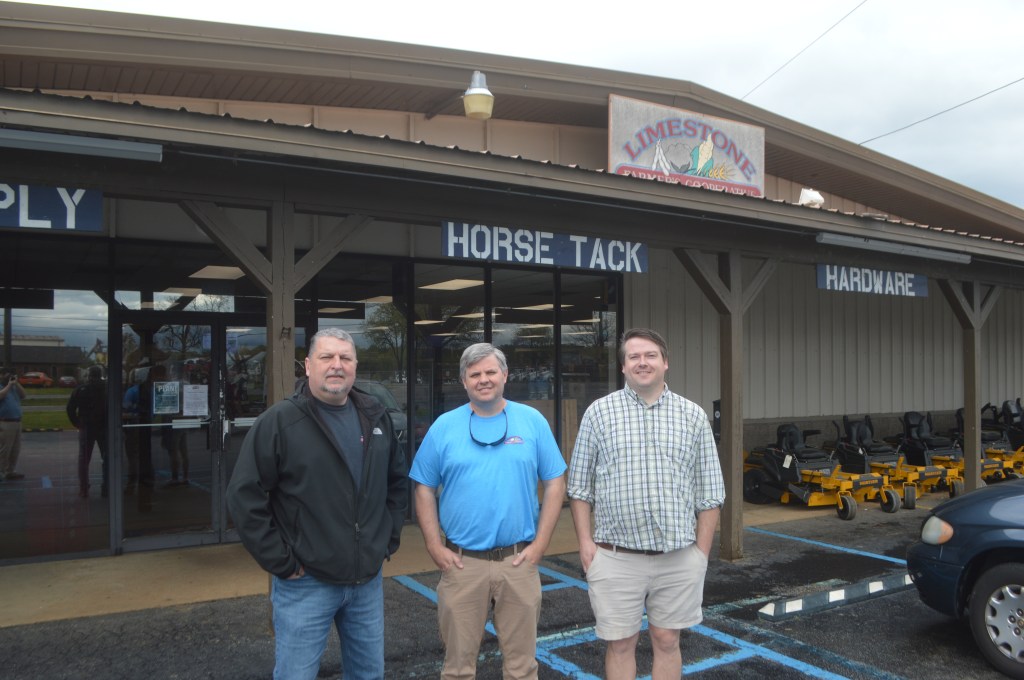THANK A FARMER: Limestone Farmers Co-op nearing century mark
Published 1:00 pm Thursday, April 15, 2021

- Department manager Jeff Wales, location manager Britt Christopher and store manager Sam Jackson all work at the Limestone Farmers Cooperative in Athens. The co-op was founded in Limestone County in 1932 and moved to its current location at 1910 U.S. 31 in the mid-1960s.
Residents of Limestone County would have to look back almost 90 years to find a time when there was not a local co-op in business.
The Limestone Farmers Cooperative was founded in 1932 and has been working to serve local growers and others ever since.
According to general manager John Curtis, Limestone Farmers Co-op was the first of its kind in the state. He said the same people who started the local business crossed the Tennessee River and founded the Decatur co-op in 1936.
Limestone Farmers Co-op was originally located on Pryor Street in Athens, “right by the railroad track.” Curtis said the business moved to 1910 U.S. 31 and has been operating there since.
Why form a co-op?
One of the main reasons to form a farmers cooperative is to assure a source of quality supplies and a market for products, according to the United States Department of Agriculture.
“Cooperatives enable farmers to own and control, on a democratic basis, business enterprises for procuring their supplies and services and marketing their products,” the USDA said in a 1980 report. “Through cooperatives, farmers can own and operate a user- or service-oriented enterprise as contrasted to an investor- or dividend-oriented enterprise. Farmer ownership allows producers to determine services and operations that will maximize their own farming profits rather than profits for the cooperative itself.”
Among the areas that co-ops help farmers with are increased farm income, improved service, quality of supplies and products, assured sources of supplies, enhanced competition, expanded markets, improved farm management, legislative support and local leadership development, the USDA said.
On offer
Limestone Farmers Cooperative offers many items and services to local farmers as well as to the public.
“We offer all of the agronomy that the farmers need: seed, chemicals, fertilizer, precision ag and feed,” he said. “We like to think we are a one-stop shop for the farmers. We deliver diesel fuel to the farmers. We have nuts and bolts, wire, nails, staples, hammers and almost anything you need out on your farm.”
Store manager Sam Jackson said the co-op also features items needed for animal health, as well as a plethora of lawn and garden items.
“We have anything to spray and fertilize your yard and control weeds,” Jackson said. “We carry all the stuff to remediate diseases that come up in your yard or garden. We stock home and garden plants as well as things like lawnmowers. We carry everything seed-wise you need to have a backyard, raised bed or container garden.”
This assortment of products and services means the co-op can cater to the needs of both large farms and weekend hobbyists. Curtis said no one needs to be a member of the co-op to purchase goods or services from the business.
Area of expertise
Staff members’ general level of expertise and the knowledge they have on the products they sell are two things that set a business like the co-op apart from some retail establishments, according to Curtis.
Curtis said almost all the employees at the co-op have a background in agriculture, in the field in which they work.
“We know our products,” he said. “We make recommendations. We specialize in agricultural-related products. What we sell, someone here has a background in it and knows about it.”
The Limestone Farmers Cooperative is made up of a number of local farms. Curtis said 90% of business goes towards corn, soybeans, cotton, wheat and cattle, the predominant ag products in North Alabama.
Curtis said farmers are sharp when it comes to business, and with the ongoing increase in technology, they depend on groups like the co-op less than in years past. However, he said services provided by the co-op continue to supplement what growers do on the farm.
North Alabama is rapidly growing, but Curtis said agriculture is still big in Limestone County, even with all the recent economic development.
“Agriculture still pays a lot of bills for a lot of people,” he said. “The Tennessee Valley as a whole — again, even with all the economic development — agriculture is still a big part of this area, and hopefully will be for a long time.”





